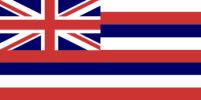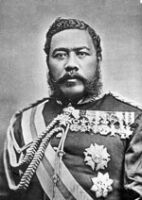Here are the beginnings of my notes on some of the Minor Powers of the Falkenstein World. At the moment, it's a little image heavy and information light, but I'm working on it.
The eventual goal is to have some pages containing some more in depth information, story ideas and links on all these nations. Obviously, this will involve a lot of work, so I will be adding to it fairly slowly. It will not be as exhaustive as I hope the Great Powers section will become; but I do hope to cover those independant nations which, are interesting to me without being powerful or influential.
All of the flags on this page come from the FOTW Flags Of The World website, a site I cannot recomend too highly to those interested in either modern or historical flags. The images of flags on this page were created by Mario Fabretto (Hawai'i, Texas) and António Martins (Araucania)
| Minor Nations | ||
 The Kingdom of Hawai'i | Ever since first contact between Hawai'i and Europe, the kings and chiefs of Hawai'i have been walking a fine line between modernisation and trying to maintain their independance. The islands comprised a shifting set of quasi-feudal principalities, which were unified into a single nation by King Kamahameha the Great at around the turn of the nineteenth century. His successor, Kamehameha II abolished the traditional religion; strangely he did this before the first missionaries arrived. The Hawaiian economy is based on exports of plantation products; principally sugar. Traditionally friendly to both Britain and the USA (a fact reflected in their national flag). The British have a small naval base at Wai Momi near Honolulu. Since Wai Momi translates as "Pearl of the Waters"; the British call this harbour "Port Waterpearl". The US, on the otherhand, maintains a sort of econimic hold over the kingdom, since most of the plantation owners are of Yankee stock, and many favour US annexation. The Kamehameha dynasty recently came to an end, and nobleman David Kalakaua was elected king by the Hawaiian parliament. An intelligent and fun-loving man, he has cautiously begun to ressurect traditional Hawaiian customs supressed by the missionaries. |  King Kalakaua of Hawai'i |
 The Republic of Texas | In Falkenstein North America, the USA never managed to expand across the Mississippi. Some American settlers did though; having been given permission by the Mexican government to settle the region known as Tejas. As in our world, relations between the settlers and the Mexican government soured; the settlers proclaimed their independence and General Houston lead Texian forces to victory before becoming president of the new republic. Unlike our world, the fiercely independent Texians never became part of the USA. During the Texian-Mexican war of the 1850s, Houston firmly declined US offers of assistance, and won the war anyway. Under the terms of the Treaty of Guadalope-Hidalgo which ended the war, the Texians ended up in control of a chunck of Mexican land (New Mexico and Arizona). The Texian economy is largely based on exports of precious metals, oil, and cattle. A large proportion of Texian cattle are driven overland to California. Others are transported to the Orleans Free State, where they are transported up the Mississippi to Chicago, but an increasing number of canneries has improved exports of processed beef. Houston is still President; his life having been extended by Indian magic. The Republic enjoys a strange sort of 'good old boy' society, combined with a sort of bare-knuckled multiculturalism. |  President Houston of Texas |
 The Kingdom of Araucania and Patagonia | Since the days of the Conquistador, the region south of the Bio Bio River in Chile has long proven intractable to European settlement. The Marpuche Indians who inhabited the area successfully resisted Spanish occupation, becoming skilled horsemen as they did so. The Spanish - who called the Marpuche the Araucanians - set the Bio Bio River as the frontier. The Republic of Chile has also had little luck in gaining control of their lands in the southern end of Chile's fertile Central Valley. In 1860, the elders of the tribal Marpuche proclaimed their nation to be a constitutional monarchy, and elected M. Orelie-Antoine de Tounens (a French lawyer living in Araucania) as their king. Soon after, he declared his kingdom to include Patagonia (which at this time was territory disputed by Chile and Argentina, but controlled by the local Indians) also. Now, in our world this situation lasted for about two years before the Chilean army simply kidnapped Orelie-Antoine and sent him back to France. But, if we adopt Falkensteinian logic, may we not presume that Orelie-Antoine has been rather more successful, and that the Arauncania-Patagonia is making a go of it as an independent kingdom? I only recently came across the story of the Araucanian Kingdom, so I haven't yet put a lot of thought into this; but I think it's an idea that may be worth pursuing. |  King Antoine-Orllie of Arauncania and Patagonia |